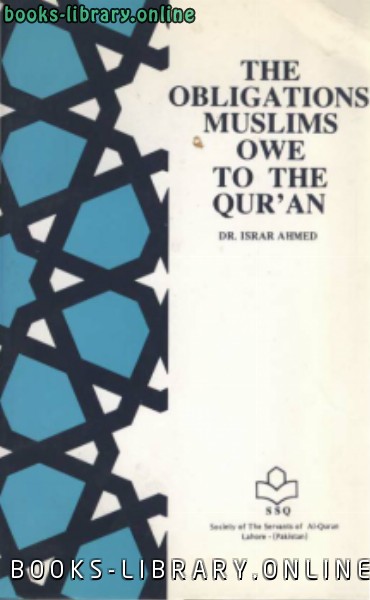كتاب THE OBLIGATIONS MUSLIMS OWE TO THE QURAN
During the last decade, international Qirat competitions have become a regular feature in the Muslim World .. These competitions, in which well-known Qura from different countries have been participating to display their rem-arkable talents for the recitation of the Quran, have served a number of purposes. The large audiences who have been listening spell-bound to the recitations of the world-famous Qura have always been moved by the unique melody, eloquence and grandeur of the Quranic diction. This may have, for the time being, ·~trengthened their belief in the Divine origin of the Quran. Morevoer, these competitions have popularised Tajwid (i.e. the art of reciting the Quran with correct pro- nunciation) in Malaysia, Indonesia and Pakistan. The Muslim children in these countries today can recite the Holy Book with much better accent and intonation than they could possibly do a few years ago. Without intending to minimise the importance of reciting the Quran properly, one might ask the question: Have these competitions helped bridge the gulf that yawns between us and the Quran today? Or, have they established a real contact between us and the book of God? The answer to this question is 'No.' Unfortunately, the great objective of establishing a real contact between us and the Quran has not been achieved even by the different religious seminars and symposia which have. been held in our country and elsewhere during the recent years. The savants and scholars who participated in the discussions at these conferences and colloquia have generally dwelt at such topics as the greatness of the Quran, its beauties and marvels etc., but no attempt has been made to consider the fundamental questions: What are our obli- gations towards the Quran? And how can we dischargeاسرار احمد - وُلِد إسرار أحمد في هيسار ، وهي مقاطعة من شرق البنجاب بالإمبراطورية الهندية البريطانية ، في 26 أبريل 1932. كان والده موظفًا حكوميًا في الحكومة البريطانية الذي نقل عائلته من هيسار إلى مونتغمري ، والآن ساهيوال ، مقاطعة البنجاب في باكستان. توفي إسرار أحمد من سكتة قلبية في منزله في لاهور صباح يوم 14 أبريل 2010 عن عمر يناهز 78 عامًا. وقد تخلى عن قيادة تنظيم الإسلام عام 2002 بسبب سوء الحالة الصحية. ] وفقًا لابنه ، تدهورت صحته في حوالي الساعة 1:30 صباحًا وألم في الظهر. لقد كان مريض القلب لفترة طويلة. وكان من بين الناجين منه زوجة وأربعة أبناء وخمس بنات. ❰ له مجموعة من الإنجازات والمؤلفات أبرزها ❞ THE OBLIGATIONS MUSLIMS OWE TO THE QURAN ❝ ❱
من مقارنة الأديان فرق ومذاهب وأفكار وردود - مكتبة المكتبة التجريبية.

قراءة كتاب THE OBLIGATIONS MUSLIMS OWE TO THE QURAN أونلاين
معلومات عن كتاب THE OBLIGATIONS MUSLIMS OWE TO THE QURAN:
have become a regular feature in the Muslim World .. These
competitions, in which well-known Qura from different
countries have been participating to display their rem-arkable
talents for the recitation of the Quran, have served a number
of purposes. The large audiences who have been listening
spell-bound to the recitations of the world-famous Qura
have always been moved by the unique melody, eloquence
and grandeur of the Quranic diction. This may have, for the
time being, ·~trengthened their belief in the Divine origin
of the Quran. Morevoer, these competitions have popularised
Tajwid (i.e. the art of reciting the Quran with correct pro-
nunciation) in Malaysia, Indonesia and Pakistan. The Muslim
children in these countries today can recite the Holy Book
with much better accent and intonation than they could
possibly do a few years ago.
Without intending to minimise the importance of reciting
the Quran properly, one might ask the question: Have
these competitions helped bridge the gulf that yawns between
us and the Quran today? Or, have they established a real
contact between us and the book of God? The answer to
this question is 'No.'
Unfortunately, the great objective of establishing a
real contact between us and the Quran has not been achieved
even by the different religious seminars and symposia which
have. been held in our country and elsewhere during the
recent years. The savants and scholars who participated
in the discussions at these conferences and colloquia have
generally dwelt at such topics as the greatness of the Quran,
its beauties and marvels etc., but no attempt has been made
to consider the fundamental questions: What are our obli-
gations towards the Quran? And how can we discharge
للكاتب/المؤلف : اسرار احمد .
دار النشر : .
عدد مرات التحميل : 5626 مرّة / مرات.
تم اضافته في : الأربعاء , 27 مارس 2019م.
حجم الكتاب عند التحميل : 2 ميجا بايت .
تعليقات ومناقشات حول الكتاب:
During the last decade, international Qirat competitions
have become a regular feature in the Muslim World .. These
competitions, in which well-known Qura from different
countries have been participating to display their rem-arkable
talents for the recitation of the Quran, have served a number
of purposes. The large audiences who have been listening
spell-bound to the recitations of the world-famous Qura
have always been moved by the unique melody, eloquence
and grandeur of the Quranic diction. This may have, for the
time being, ·~trengthened their belief in the Divine origin
of the Quran. Morevoer, these competitions have popularised
Tajwid (i.e. the art of reciting the Quran with correct pro-
nunciation) in Malaysia, Indonesia and Pakistan. The Muslim
children in these countries today can recite the Holy Book
with much better accent and intonation than they could
possibly do a few years ago.
Without intending to minimise the importance of reciting
the Quran properly, one might ask the question: Have
these competitions helped bridge the gulf that yawns between
us and the Quran today? Or, have they established a real
contact between us and the book of God? The answer to
this question is 'No.'
Unfortunately, the great objective of establishing a
real contact between us and the Quran has not been achieved
even by the different religious seminars and symposia which
have. been held in our country and elsewhere during the
recent years. The savants and scholars who participated
in the discussions at these conferences and colloquia have
generally dwelt at such topics as the greatness of the Quran,
its beauties and marvels etc., but no attempt has been made
to consider the fundamental questions: What are our obli-
gations towards the Quran? And how can we discharge
these obligations? So far as the glory and greatness of the
Quran is concerned, we believe it is indescribable and its
adequate comprehension is beyond the reach of human
mind. It is best known to the Lord of the heavens and the
earth Whose word it is or to his blessed messenger to whom
it was revealed.
Therefore, instead of making a presumptuous attempt
at describing its unique merits, the most pertinent thing
for us to do is that we should clearly understand our duties
and responsibilities towards the Quran and then see whether
or not we are conscientiously fulfilling ·these duties and
responsibilities. If we find that we are not doing so, we
should seriously think obout the line of action we should
adopt for their fulfilment; and then adopt the line without
any further delay because our very salvation depends on
our efforts in this direction. Paying pompous compliments
to the Quran will not· be enough and it cannot be a sub-
stitute for actually discharging our obligations towards
the Holy Book.
Now what are these obligations·?. Or, in other words,
what does the Quran demand from us?
The Quran makes five Demands from every Muslim.
Put in a· ~imple Language, these demands are as follows
1. A Muslim is required to believe in the Quran.
2. He is required to read it.
3. He is required to understand it.
4. He is required-to act upon its teachings.
5. He is required to convey its teachings to others .
. We will now ponder over these demands or obligations
in some depth along with a brief explanation of the terms
in which they have been expressed in the Quran itself so
that besides getting a clear idea of his duties towards the
Quran, the reader may also become familiar with basic
 مهلاً !
مهلاً !قبل تحميل الكتاب .. يجب ان يتوفر لديكم برنامج تشغيل وقراءة ملفات pdf
يمكن تحميلة من هنا 'تحميل البرنامج'

نوع الكتاب : pdf.
اذا اعجبك الكتاب فضلاً اضغط على أعجبني و يمكنك تحميله من هنا:


كتب اخرى في مقارنة الأديان

die stellung der frau im judentum christentum und islam PDF
قراءة و تحميل كتاب die stellung der frau im judentum christentum und islam PDF مجانا
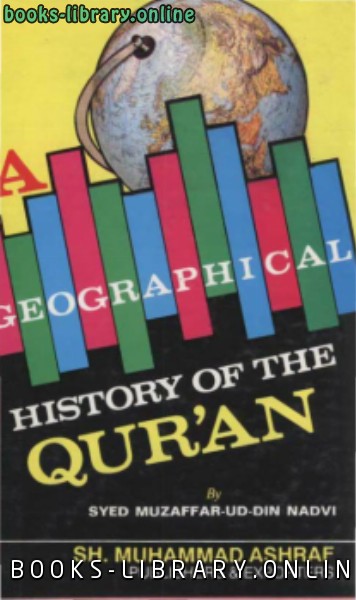
A GEOGRAPHICAL HISTORY OF THE QUR AN PDF
قراءة و تحميل كتاب A GEOGRAPHICAL HISTORY OF THE QUR AN PDF مجانا

THE CONCEPT OF GOD S MERCY IN ISLAM AND CHRISTIANITY PDF
قراءة و تحميل كتاب THE CONCEPT OF GOD S MERCY IN ISLAM AND CHRISTIANITY PDF مجانا
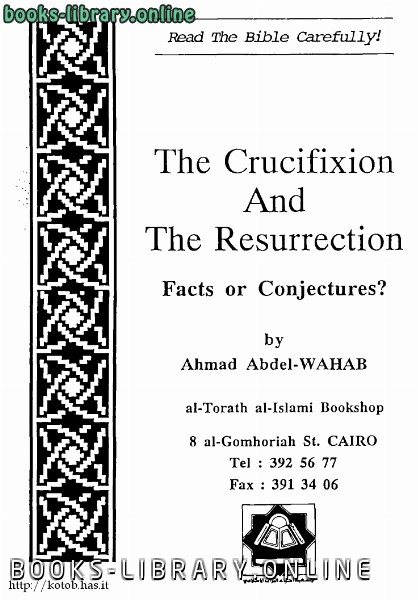
the crucifixion and the resurrection facts or conjectures? PDF
قراءة و تحميل كتاب the crucifixion and the resurrection facts or conjectures? PDF مجانا
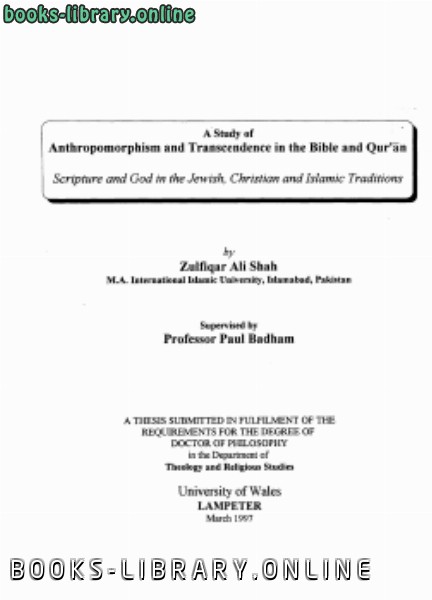
A Study of Anthropomorphism and Transcendence in the Bible and Qur an PDF
قراءة و تحميل كتاب A Study of Anthropomorphism and Transcendence in the Bible and Qur an PDF مجانا
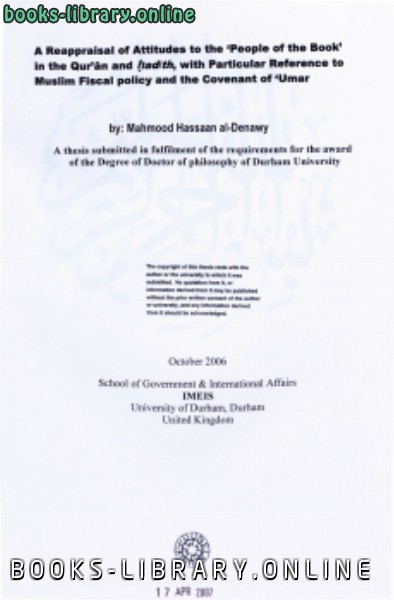
A Reappraisal of Attitudes to the People of the Book in the Qur an and hadrth with articular Reference to Muslim Fiscal policy and the Covenant of Umar PDF
قراءة و تحميل كتاب A Reappraisal of Attitudes to the People of the Book in the Qur an and hadrth with articular Reference to Muslim Fiscal policy and the Covenant of Umar PDF مجانا
